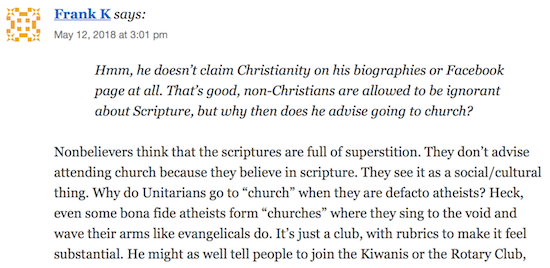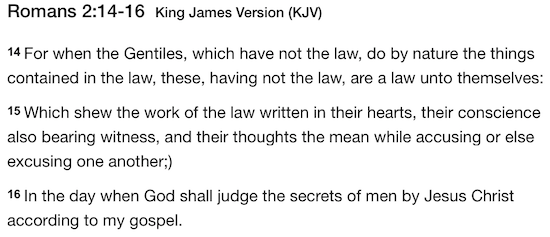Skeptics should quit being faggots. What is a skeptic? It necessarily includes atheists, but also includes agnostics, and any nominal believer that doesn’t take religious texts at face-value.
Unfortunately, it’s more difficult to make this argument than it ought to be, because it often seems like the only alternative is joining hands with the filthiest of kooks. This is a good example:

There are very few people who are so irrational as to believe that the Bible is a history book. All these people are charitably believed to be, by Frank K’s definition, nonbelievers, and given that he labels all and every ‘Unitarian’ a nonbeliever, we’re being conservative. What Frank K. seems to be labeling ‘nonbelievers’ is roughly equal to what I’m calling a skeptic.
Nonbelievers have a wide diversity of views on the matter of religious texts. Most of the skeptics I know are Catholics, most of these go to mass regularly, and take the New Testament as a point of faith and a source of good advice. In the past I hung out with evangelical atheists, but for the most part, I found them about as interesting as their religious counterparts.
Frank isn’t wrong about everything. Wimminz do see religion as a social event, or an outlet for nonverbal communication. They wear their religious preference as they would a pair of shoes. Men — including skeptics — do not tend to do this. Skeptical men can continue to appreciate religion as a discipline, as an outlet for exploring the underlying mysteries of life, and to bond with other men in an entirely sublimated, healthy, heterosexual, non-touchy-feely fashion.
The evangelical atheist tends to be a specific type of person; namely, he’s the type that can cultivate an acceptable moral sensibility without ritual. The fact that ritual would simplify his cultivation of morality will, even if admitted, be argued to outweigh the supposed negative aspects of ritual. The skeptic is often driven over to the strange delusion that everyone is exactly as intuitive as he is, and as such, that religion is entirely unnecessary. This is particularly silly, because even as he makes this argument, he’ll be (often unknowingly) quoting Rabbi Saul of Tarsus, who wrote:

Religious praxis is useful because it gives people the means to self-organize. It’s also useful because it contains the thoughtless and the irrational impulses of man, channeling them to prosocial ends, even as it socializes the man himself. The evangelical atheist doesn’t need religion because he can self-organize, and thus he sees religious people as either deluded victims or inferior subhumans. One will note that this is a delusion parallel to that which drives people like Frank K., who, because they are unable to construct an ethical life without a text to guide them, assume that all atheists are bloodthirsty cannibals.
Because you would be a bloodthirsty cannibal without mythology doesn’t entail your own weaknesses exist generally in the population.
Skeptics should thus begin taking advantage of religious organizations, despite the overwhelming presence of weirdos and fanatics in attendance. If they do, they’ll likely find (as I have) that a large portion of those attending share their commitment to a rational, examined life, even as they gain a community, and find one of the last remnants of male space.